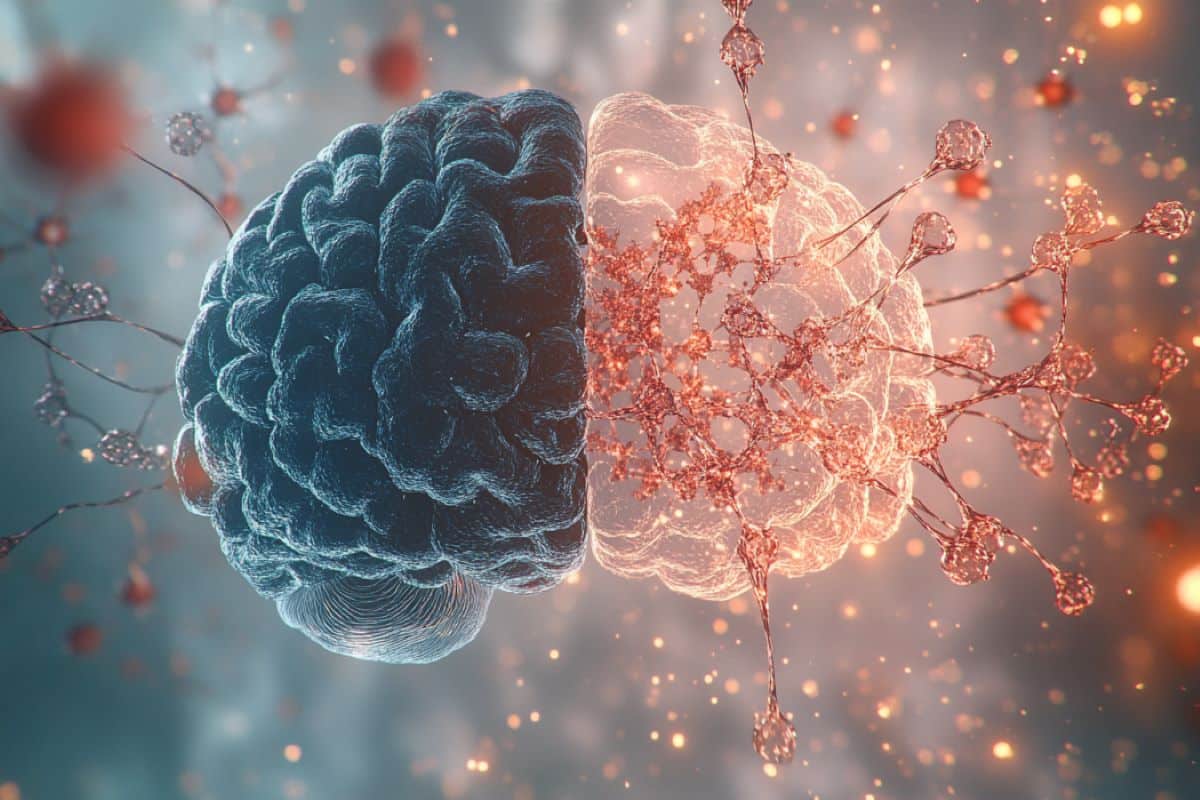Summary: New research reveals that prion disease mutations can alter the structure of neuron synapses long before symptoms emerge. Scientists studied neurons derived from induced pluripotent stem cells (iPSCs) of patients with the E200K prion protein mutation, showing changes in neuron-to-neuron contact sites even in the absence of misfolded prion proteins.
This finding suggests that prion diseases may involve a loss of normal prion function, contributing to early damage in the brain. The study highlights how iPSC technology can deepen understanding of prion diseases and may help in testing future therapies.
Key Facts:
- Prion disease mutations disrupt neuron synapses before symptoms develop.
- iPSC-derived neurons help researchers study the early stages of prion diseases.
- Findings could lead to therapeutic insights applicable to other neurodegenerative diseases.
Source: Boston University
Genetic prion disease generally manifests with cognitive difficulties, poor muscle control and abrupt jerking movements of muscle groups and/or entire limbs.
The three major phenotypes of genetic prion disease are genetic Creutzfeldt-Jakob disease (gCJD), fatal familial insomnia (FFI), and Gerstmann-Sträussler-Scheinker (GSS) syndrome.
The most common cause of inherited prion diseases is the E200K mutation of the prion protein (PrP). It is often thought that this mutation causes disease by making PrP more susceptible to misfolding into a pathogenic shape (PrPSc).

However, new research from Boston University Chobanian & Avedisian School of Medicine and Boston Medical Center (BMC) has found that the architecture of neuron-to-neuron contact sites, known as synapses, is altered in neurons expressing this mutant PrP in the absence of PrPSc. This suggests that a loss or change in PrP function may contribute to the disease phenotype.
“Our findings suggest that there could be detectable abnormalities in neurons long before the primary symptoms of inherited prion diseases appear,” explained co-corresponding author David A. Harris, MD, PhD, the Edgar Minas Housepian professor and chair of the department of biochemistry & cell biology at the school.
Harris and his colleagues made a large library of induced pluripotent stem cells (iPSCs) (blood cells that have been reprogrammed back into an embryonic-like pluripotent state that enables the development of an unlimited source of any type of human cell needed for therapeutic purposes) from a family harboring this mutation, and differentiated them into neurons. They then compared the neurons from mutation carriers to neurons from non-carriers.
They also used CRISPR/Cas9 technology to correct the mutation in two lines, so they could perform these comparisons between neurons with identical genetic backgrounds aside from the mutation of interest.
According to the researchers, the use of iPSC technology is a step closer to personalized medicine.
“Our study employs the largest collection of iPSCs from a family harboring an inherited prion disease that we are aware of. iPSC-derived neurons can provide important mechanistic insights into the pathogenesis of genetic prion diseases, and can offer a powerful platform for testing candidate therapeutics,” said co-corresponding author Gustavo Mostoslavsky, MD, PhD, professor of medicine & microbiology at the school and co-director at the BU and BMC Center for Regenerative Medicine.
The researchers believe this study advances understanding of this rare but devastating group of neurodegenerative disorders that damage the connections between nerve cells in the brain, and provides a guide to treatments that may be most effective in combating the symptoms of these disorders.
“Similar therapeutic approaches may also be applicable to Alzheimer’s and other neurodegenerative diseases, some cases of which are inherited,” said Harris.
These findings appear online in Stem Cell Reports.
Funding: Nhat T.T. Le was supported by a Warren Alpert Distinguished Scholar Award (Ltr dtd 3/28/2019). Work in the Mostoslavsky lab is supported by NIH Grants N0175N92020C00005 and 1R01DA051889-01 as well as a grant from the CJD Foundation. Work in the Harris lab is supported by NIH R01 NS065244. This work was also supported by NIH grant 1R21NS111499-01 to GM and DAH.
About this prion disease and genetics research news
Author: Gina DiGravio
Source: Boston University
Contact: Gina DiGravio – Boston University
Image: The image is credited to Neuroscience News
Original Research: Open access.
“Abnormal synaptic architecture in iPSC-derived neurons from a multi-generational family with genetic Creutzfeldt-Jakob disease” by David A. Harris et al. Stem Cell Reports
Abstract
Abnormal synaptic architecture in iPSC-derived neurons from a multi-generational family with genetic Creutzfeldt-Jakob disease
Genetic prion diseases are caused by mutations in PRNP, which encodes the prion protein (PrPC). Why these mutations are pathogenic, and how they alter the properties of PrPC are poorly understood.
We have consented and accessed 22 individuals of a multi-generational Israeli family harboring the highly penetrant E200K PRNP mutation and generated a library of induced pluripotent stem cells (iPSCs) representing nine carriers and four non-carriers.
iPSC-derived neurons from E200K carriers display abnormal synaptic architecture characterized by misalignment of postsynaptic NMDA receptors with the cytoplasmic scaffolding protein PSD95.
Differentiated neurons from mutation carriers do not produce PrPSc, the aggregated and infectious conformer of PrP, suggesting that loss of a physiological function of PrPC may contribute to the disease phenotype.
Our study shows that iPSC-derived neurons can provide important mechanistic insights into the pathogenesis of genetic prion diseases and can offer a powerful platform for testing candidate therapeutics.






